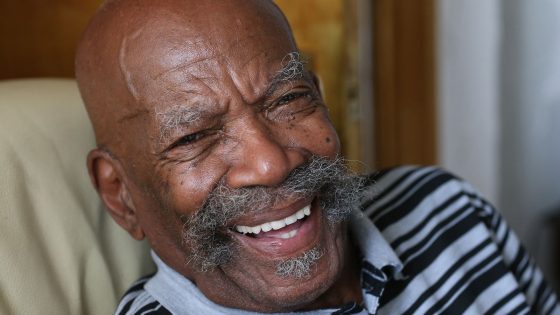A 30-second video of a routine traffic stop that ended with Rochester police smashing in a Black man’s car window was enough to rattle Mike Johnson.
The man in the video posted a clip of the May 7 incident to his Facebook page earlier this month. The video was short and left much unseen, but Johnson, a community activist with the group Save Rochester, had questions about what happened.
When Rochester police released a statement and body-worn camera footage of the confrontation this week, Johnson said their answers revealed thinly veiled discrimination.
In a press release, RPD said they caught motorist Marvin Taylor driving with an expired inspection and ran his plates to see if the car was stolen. It was not.
The agency accused Taylor of failing to stop immediately for police. In body-worn camera footage, one officer used this as an excuse to approach Taylor’s car with his gun drawn.
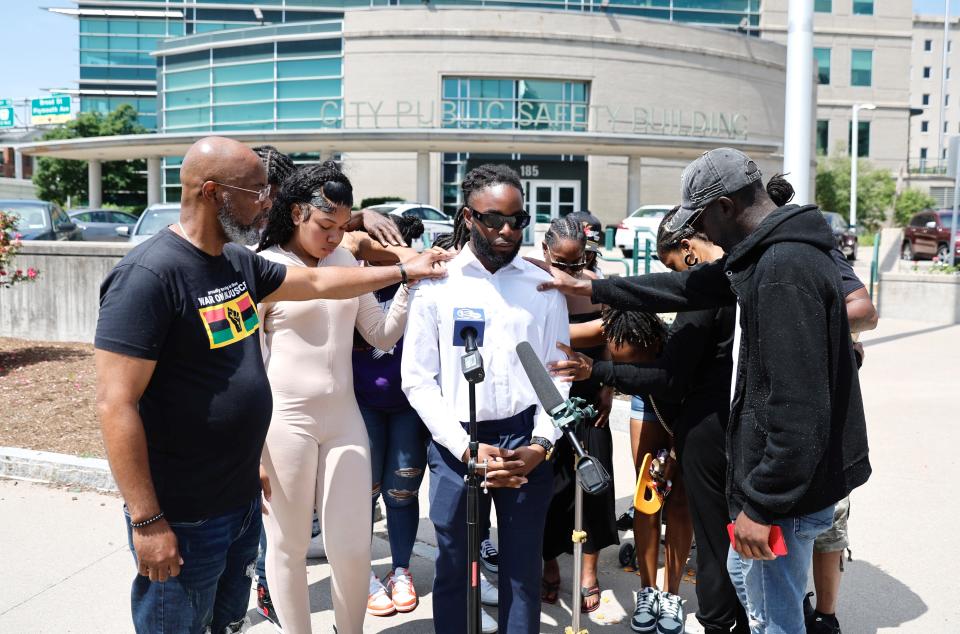
A review of addresses given by police show Taylor stopped less than a block away ― 10 houses or less ― from where they attempted to pull him over at the corner of Remington and Dale streets.
And after Taylor was forcibly removed from the car, an officer accused him of trying to conceal illegal drugs. None were found.
“It’s almost as if officers are excused for treating Black citizens like criminals before they’ve even begun an investigation,” Johnson said in an interview.
At a press conference for Taylor Thursday morning, Rochester resident Frederick Walker put it more plainly: “This is known as being stuck with DWB,” he said. “Driving While Black.”
How did a routine traffic stop end with smashed windows?
Police said they broke Taylor’s window and pulled him from the car because he ignored orders from officers to roll down his tinted rear windows and exit his vehicle.
Taylor said he refused to get out of the car because officers wouldn’t explain to him why they pulled him over when he rolled down his driver side window to talk to them. He wouldn’t learn until later that police claim he failed to use a turn signal at the intersection.
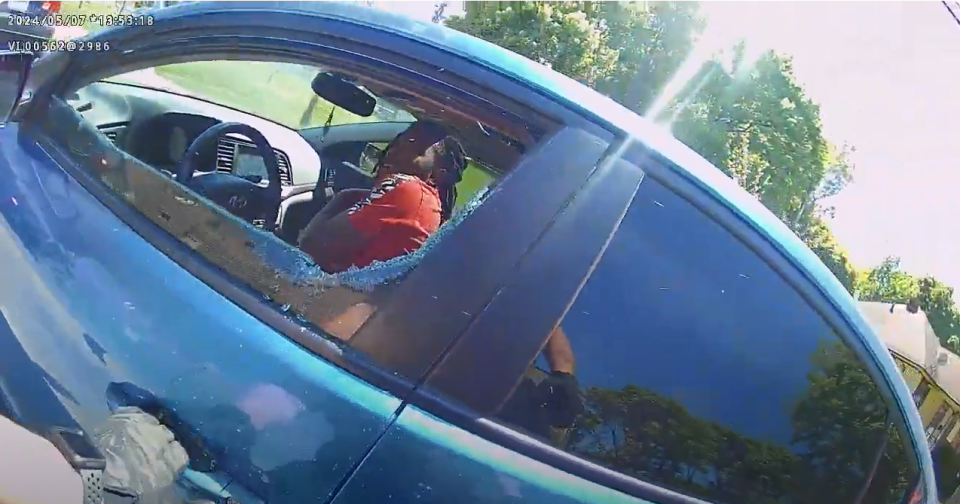

In an interview, the 22-year-old said he’s been stopped by police at least a dozen times over the last few years. Twice, he said, police ordered him out of the car and searched it only to come up empty-handed.
This time, with a gun drawn in his direction, Taylor wanted to know why he was stopped.
He was almost home. He had only turned onto Dale Street because his house, one block over, was on a one-way street.
“Our officers are tasked with doing an incredibly dangerous job on a daily basis,” RPD Chief David Smith said in a statement about the incident. “Situations, like these, in which a motorist refuses a reasonable direction to lower the windows creates an unsafe situation for everyone involved. Cooperation from the motorist would easily have prevented this incident from escalating.”
Johnson said he knew video of Taylor refusing to roll down his back windows would cause doubt in the community over whether police force in this case was justified. But he points back to the officer’s gun and the immediate orders as reasons for Taylor’s apprehension.
More: A police officer orders you to exit your car during a traffic stop. Do you have to comply?
Would a different approach have changed outcome in Dale Street traffic stop?
He lives in a part of Rochester that historically has limited power and faces heavy police presence. There is a legacy of mistrust and fear of the police within the Black community because of prior negative interactions.
“Of course we want officers to be safe,” Johnson said. “But when you approach citizens in a combative manner, treating them as criminals, it immediately puts us on the defense. And when we’re on the defense, officers use that as justification for escalating the encounter.”
New York police must have probable cause to initiate a traffic stop, but they are not required to immediately tell you why they pulled you over. Still, research shows that in traffic stops that ended with police force, officers were more likely to start with an order and withhold the reason for the stop.
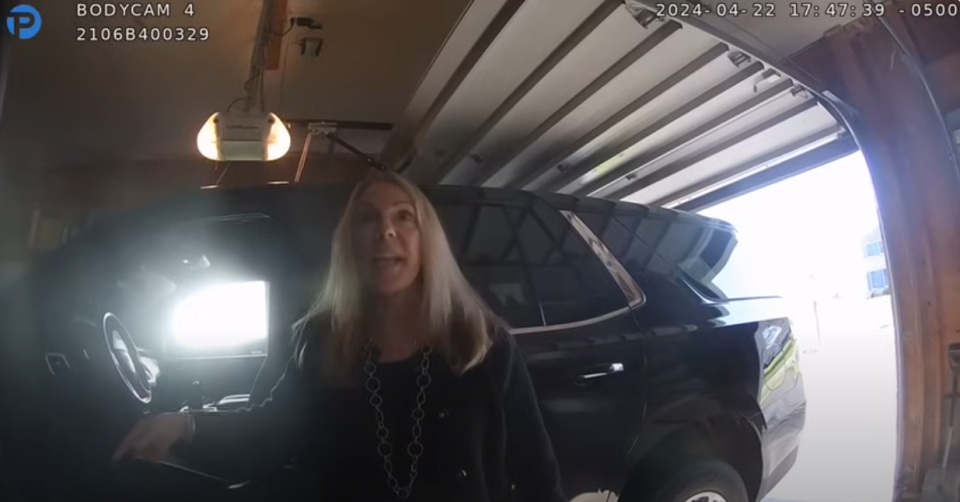

And Johnson said Taylor is being unfairly scrutinized for his actions during the traffic stop when, two weeks prior, Monroe County District Attorney Sandra Doorley showed more aggression and evasion of police during a traffic stop for speeding.
Doorley ignored a Webster police officer’s lights and sirens for nearly a half mile, parked in her garage, rebuffed the officer’s orders, berated him with insults and went in and out of her home with impunity. Officers never moved to restrain her and pleaded with the district attorney for nearly 15 minutes before issuing a ticket.
The police interaction with Taylor lasted about three minutes. After police pulled him from the car, they forced him to the ground, where one officer placed their knee on Taylor’s head and neck to restrain him.
More: Two traffic stops, two outcomes: Comparing Doorley and Taylor incidents
“It was like a soliloquy explaining to Sandra Doorley why she was wrong,” Johnson said. “Marvin couldn’t get a basic explanation of why he was pulled over.
“As a Black man, it is so infuriating to see that played out,” he continued. “We’ve been saying this type of treatment, this discrepancy, existed for so long, and to just see it played out in front of everyone and people still not acknowledge it? It’s just so frustrating.”
‘I’m a Black man in America. This happens every day’
Stories of mistreatment by police are shared like cautionary tales among Rochester’s Black community.
Treshaun Moore said as a young, Black man, he was taught that police would have no problem stopping someone who looked like him on the street, just to hope they catch someone with guns or drugs to justify their actions.
It hasn’t happened to him yet, but watching the video of Taylor’s traffic stop ― someone he has known almost his whole life ― was all the evidence Moore needed to believe those stories are more than just folktales.
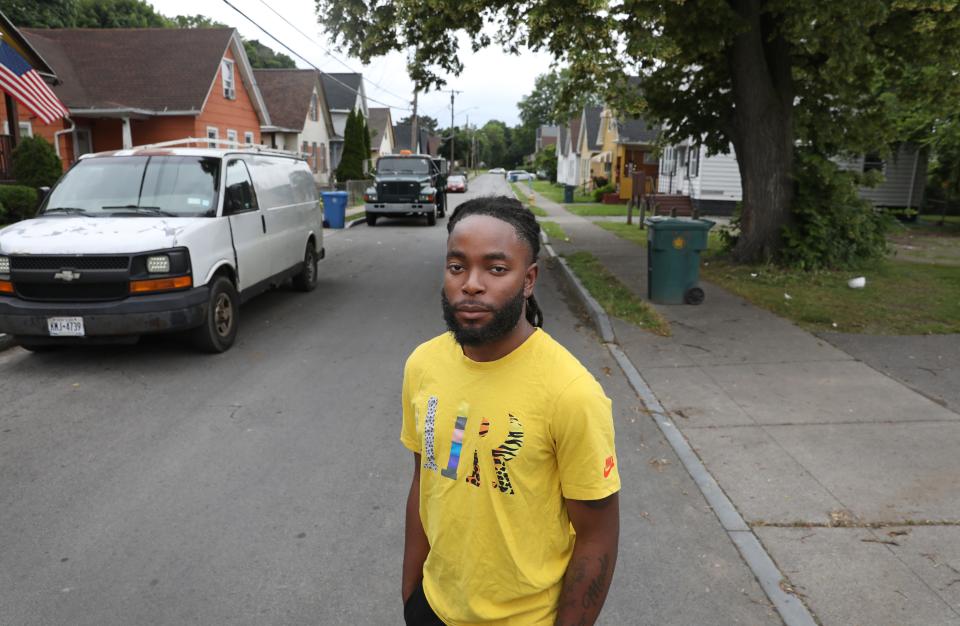

He said police failed to realize his friend’s potential character: Taylor has lived in that neighborhood since he was a boy and started helping his mom pay the bills as a teenager. He breeds French Bulldogs and American Bullies and spends his free time traveling to dog shows across the country.
In the body-worn camera footage, a police supervisor approached Taylor in the back of the cruiser with a hint of astonishment: “They tell me you don’t even have a record.”
“It’s preconceived notions,” Moore said.
At the press conference, Taylor said he wasn’t sure if rolling down his tinted windows would have changed the situation. “Do you think they were still not going to drag me out the car?” he asked.
“I’m a Black man in America. This happens every day to somebody,” he said.
— Kayla Canne reports on community justice and safety efforts for the Democrat and Chronicle. Follow her on Twitter @kaylacanne and @bykaylacanne on Instagram. Get in touch at [email protected].
— Reporter Madison Scott contributed reporting to this article.
This article originally appeared on Rochester Democrat and Chronicle: ‘Driving While Black:’ NY traffic stop unsurprising to activists
Source Agencies

